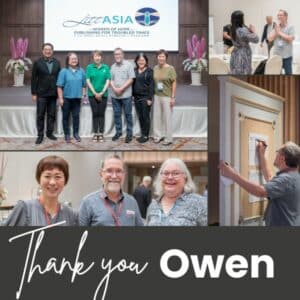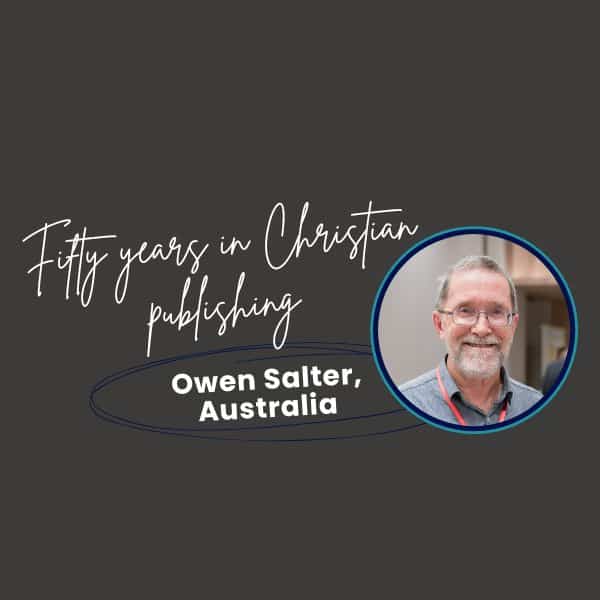It’s been almost 50 years in Christian publishing for Australian editor and former MAI-Asia Board member Owen Salter. He shares highlights from his journey and how books have impacted his life.
The story I’ve thought about since 1983
In 1983, I had the privilege of going to Amsterdam ’83, the first Billy Graham conference for itinerant evangelists from all over the world, as part of the press pool.
A young Australian evangelist was there who shared a story with me about his African roommate. Every morning, when his alarm went off, this man would grab hold of his blanket and roll straight out of bed onto his knees to pray.
That story has motivated me since 1983! That African guy never even knew that he was observed, or that this observation impacted someone, who passed it on to someone else. And I’ve passed it on to other people.
That’s one of the terrific things about serving God. There’s a chain reaction that sets off ripples in the pond, and we can rely on God to do that. Occasionally, when it’s good for us, He lets us see some of the ripples.
Beginnings: editing a start-up Christian magazine
I got involved with a fledgling Christian magazine in 1977, fresh out of university. “Periodically inspired,” we called it; it only came out when there was enough money, and we were making the whole thing up as we went along.
It was called On Being and sought to ground the activist Jesus Movement of the time in solid theology—that is, our actions come from our being, rather than the other way around. It was the first of its kind. The idea of an interdenominational Christian magazine was quite radical in Australia at the time, and people came to really respect it in that space.
Eventually, On Being grew in professionalism and went to being published bi-monthly, then monthly. I was editor for 14 years. That’s where I learned the foundations of everything I know about editing.
It was all done on a shoestring budget, almost a backyard kind of operation—the sort of thing a lot of places around the world have to do to keep going. It wasn’t something handed on a plate. But as long as God gives you something to do, you keep doing it.
Just the right books at just the right time
The big life impact books are not necessarily the well-known ones. They’re the ones that come along at the right time for you and that God uses for you.
Many of the books I’ve worked on as an editor have circulated primarily in Australia as home-grown Christian literature. One by a Bible teacher named David Boan, The Framework, was a masterly overview of how the total story of the Bible fits together and how Christian life works. It’s out of print now, but it was absolutely life-forming for me.
Why Warriors Lie Down and Die? was about the devastation of Australia’s Aboriginal cultures in the face of the dominance of western culture. It was a very influential book and widely read. That was a very satisfying book to work on.
In 1984, I read a book called Companion to the Poor, written by a New Zealander named Viv Grigg who was pioneering a new way of doing mission in the Philippines—living in a Manila slum. That book impacted me enormously, and put in my heart a desire to serve people in the majority world. Thirty years after reading it, my wife and I spent 2.5 years volunteering with a Christian group in Cambodia working to prevent child trafficking.
It was also part of what led me to MAI—the long influence of that book shaped our attitudes to be lovers of Jesus, lovers of others.
“You will not tell us anything, we will ask you questions.”
In 1991, around the end of my time as editor of On Being, I was introduced to Larry Brook, a well-known writer trainer with links to MAI. He offered me the opportunity to do some volunteer training in Indonesia for 2-3 weeks.
I was coming off many years of editing a magazine which was already very much a champion of majority world voices. We’d interview people or ask them to write to get those voices from the emerging global church in the magazine. And so I’d been primed for this work.
I helped conduct a magazine production workshop for a Bible college running a media course. After that, I visited the Christian publisher Bina Kasih to spend time with a group of publishing trainees. When I met the director, Bapak Oppusungu, the first thing he said to me was, “You will not tell us anything, we will ask you questions.”
It was the most stimulating time. I got the questions they wanted to know. It pulled so much out of me I wouldn’t have thought to give otherwise. That experience really captured my imagination and gave me the taste to pass on what God had taught me to other people.
I’ve had little formal training in how to train others; it has mostly been learned in the trenches over the years. That’s actually a good way to learn it, so you can pass it on to others who don’t have the advantage of getting to do some high-flying course.
“This is my tribe.”
In 1993 I moved into freelance book editing. I started receiving MAI’s newsletter in 1998 from John Maust, who had just become CEO after Bob Reekie. As I read, the idea started to grow that I would love to be involved in MAI’s ministry.
My first LittWorld was in the Philippines in 2004, and it was absolutely perfect. Back home, when you say you’re a book editor, most people’s eyes glaze over, but at an MAI event they say, “Really?!” and want to know what comes next. Then you get to share back and forth.
That’s one of the things I love most about MAI. The ethos Bob and John established in the beginning—that collegial body life, the mutual honor and respect for one another and one’s another’s gifts, and recognition that everyone has something to bring to the table. It’s not just experts teaching novices what to do—even novices have something to teach.
 MAI is one of the places where I experience the body of Christ working the way it’s meant to work. The culture is self-perpetuating; people pick it up by osmosis. I love seeing that aspect of it.
MAI is one of the places where I experience the body of Christ working the way it’s meant to work. The culture is self-perpetuating; people pick it up by osmosis. I love seeing that aspect of it.
When I walked into that first LittWorld, I felt, “This is my tribe.” I told John, “If I can be useful, I’m available.”
I next went to an MAI “Train the Trainers” workshop, again in the Philippines, then to LittWorld in Brazil in 2006. Since then I’ve helped with training in editing and writing for MAI in Nepal, Pakistan, Mongolia, Cambodia, Hong Kong and Fiji, as well as at a number of LittWorlds.
When I was invited by Bernice Lee to join the MAI-Asia Board, I was very surprised—because I’m not Asian! Bernice told me she had a wider vision for the whole Asia-Pacific. I thought and prayed about it, and it seemed to be something that God had opened up, so I said yes.
Emerging trainers from the Majority World—and other joys of serving with MAI
The most encouraging things about serving with MAI have almost always been people related—fellowship across cultures, people groups, languages, church traditions and so forth.
The thing that really stirs me is to see the way that God continues to put passion for the written word into people’s hearts. It’s not just something you whip up from outside. I keep meeting people with fire in their heart, people who have that God-inspired passion for something, prepared against the odds to give it a go.
That’s pretty inspiring. You want to do what you can to encourage people like that. Because that’s the background I came from. People with a passion and just giving it a go. Somehow, by God’s grace, He makes things work.
Another thing I’ve found really encouraging is the perseverance of people facing huge difficulties. It’s not easy to publish in some places. Many countries aren’t Christian, and the Christians who are there are not necessarily readers. But people are really stirred and strengthened by the Holy Spirit to keep going. It’s like reading the NT—the apostles just kept getting up, and the whole early church. That’s pretty inspiring.
It’s been 20 years since I went to my first LittWorld, and in those years—not just in MAI-Asia but across MAI—I’ve seen the emergence of trainers from within the majority world. People who themselves came for training are now trainers, and are raising up the next generation and doing it in a way that in turn will raise another generation by God’s grace. To me that’s amazing.
Passing on the baton—tips for Christian publishers and editors
The thing I’ve learned in nearly 50 years in the Christian writing, editing and publishing sphere is that the most important thing by far has nothing to do with your professional skills—it’s your personal walk of discipleship.
The things that have impacted my ministry most profoundly have been the life lessons that God has provided—lessons that apply not only to my ‘calling’ or my professional work, but to every part of life. The work that God by His grace has done to grow and change me: the trials, the valleys, the ups and downs¬. Those are the lessons that have equipped me to fulfil the calling on my life most effectively.
It’s good to do training, to upskill, go to events—all that’s fantastic. And it’s great to share expertise and wisdom. But in terms of passion for the work, persevering in the work, spiritual maturity for the work, discernment—it’s really the things that you allow God to do in you as a person that most significantly grow your effectiveness.
When I look at MAI, it’s the character of people that stays with me. I love their work—but it’s the mark of Jesus on their lives that lingers. They allow God to mold their lives, and that’s why they’re able to be effective.
People teach you lessons they didn’t even intend to teach, almost as a side effect of their quality of faith and life. I learned one pivotal lesson from an African lady called Rose Bugusu, who founded a children’s home and school in western Kenya for very poor village children. One day she said to me, “The road of discipleship is the hardest road, but all the blessings are on that road.”
That has stayed with me, like a touchstone of my walk. It is so true. The road of discipleship, the road of obedience—it’s got its tough times, its valleys, its troughs. But all the blessings are on that road.
You take the easy road, not a lot of blessings out there. God still looks after us—He’s Emmanuel, “God with us”, no matter what choices we make, if we belong to Him. But to walk the road of discipleship, the hard road—that’s where the blessings are that are worth talking about.
That’s what I would pass on—not any particular lessons about editing or publishing!
Impact is up to God
One of my favorite stories is about Amy Carmichael, who was a missionary to India and a great writer.
For the last 20 years of her life, she was bedridden and had to write on a tray. Then the time came when she couldn’t hold a pen and had to dictate her books. But her books kept coming out! She was stuck in bed, but God has allowed her work to still reverberate today.
You don’t have to be concerned about whether you can produce the next great Christian book or be the next C.S. Lewis. You give God what you’ve got, and it’s up to Him what He does with it. Then all the glory goes to Him.
Praying for next steps
In terms of writing, my main work has been collaborative writing and ghostwriting. That’s a way I can serve with the particular gifts God gave me.
I am currently collaborating with a Christian leader in Melbourne on a book about discipleship. It’s about getting past our preoccupations and western concepts of what discipleship means, and learning lessons from the vibrant church in the majority world—getting back to Jesus’ idea about what disciple is, becoming like Him and the outflow of what that means.
Additional resources
- Skills to Excel in Developmental Editing – an MAI webinar by Owen Salter
- 5 Keys to Successful Copyediting – tips from Owen Salter at LittWorld 2015

